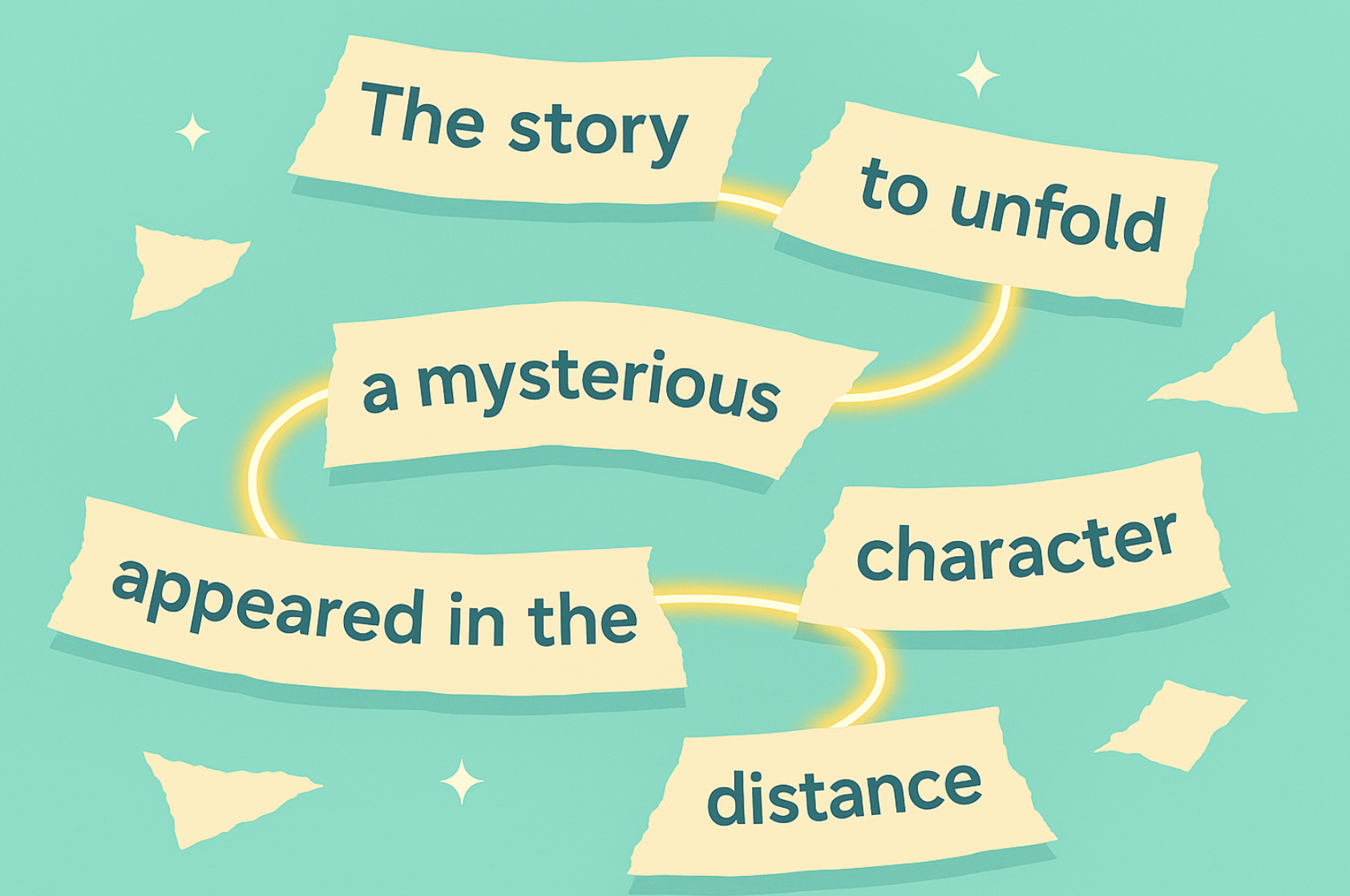Have you ever written a sentence, paused, and then realized it doesn’t actually make sense on its own? That’s what we call a sentence fragment.
Fragments sneak into our writing more often than we’d like to admit. They show up in quick emails, rough drafts, even polished essays. Sometimes writers use them intentionally for style (“So close. Not again.”). But most of the time, fragments happen by accident, leaving the reader confused and asking: “Wait… was that supposed to be the whole thought?”
So, what is a fragment sentence? In simple terms, it’s an incomplete sentence—one missing a subject, a verb, or a complete idea. And while fragments might be fine in casual conversation, in writing they can make your work look sloppy or unclear.
In this guide, we’ll break down the sentence fragment definition with examples, show you over 30 sentence fragment examples and corrections, explain why they happen, and even talk about when they’re okay to use for effect. By the end, you’ll know exactly how to spot and fix fragments—so your writing flows clearly and confidently.
What Is a Sentence Fragment?
A sentence fragment is exactly what it sounds like: a piece of a sentence that doesn’t form a complete thought. It may be missing a subject, a verb, or both, and often leaves the reader hanging. Think of it like baking a cake but forgetting the flour—it looks like something’s there, but it isn’t finished.
For example:
Fragment: “After the long day at work.”
This leaves you waiting. After the long day… what happened? The thought is incomplete.
Correction: “After the long day at work, Maria collapsed onto the couch.”
Now the idea is finished, with both a subject and an action.
Fragments happen in different ways. Sometimes it’s a dependent clause that can’t stand alone. Other times it’s just a phrase like “Running down the street” with no subject to tell us who’s doing the running. In conversation, fragments can sound natural because we talk in pieces all the time, but in formal writing, they can confuse your reader.
So, when you hear the term sentence fragment definition examples, what it really means is this: fragments are incomplete sentences that don’t communicate a full thought, and fixing them usually means adding the missing subject, verb, or connection to the rest of the sentence.
Your Publishing Journey Awaits – Start NowCommon Sentence Fragment Examples and Corrections
Sentence fragments can sneak into your writing in several different forms. Sometimes they’re just missing one piece, like a subject or verb, and other times they look like full sentences but don’t carry a complete idea. Below are the most common types, along with examples and easy fixes.
Fragments Missing a Subject
Without a subject—the person or thing doing the action—the sentence feels unfinished.
- Fragment: “Went to the store after work.”
- Correction: “She went to the store after work.”
In the first version, we don’t know who went to the store. Adding the subject makes the sentence clear.
Fragments Missing a Verb
A sentence also needs a verb to show action or being. Without it, you’re left with a dangling idea.
- Fragment: “The boy with the red hat.”
- Correction: “The boy with the red hat waved at his friends.”
The fragment introduces a character, but nothing is happening. The correction adds action and completes the thought.
Dependent Clause Fragments
Dependent clauses begin with words like because, although, when, if, or unless. They look like sentences but can’t stand alone.
- Fragment: “Because it was raining.”
- Correction: “Because it was raining, the game was canceled.”
The fragment leaves the reader waiting for the rest of the thought. The correction ties it to an independent clause.
Phrase Fragments
Phrases (like prepositional phrases, infinitives, or participles) often look like sentences but lack the full subject–verb combo.
- Fragment: “Running through the neighborhood.”
- Correction: “He was running through the neighborhood.”
Here, the action is there, but the subject is missing. Adding “he” makes it complete.
Afterthought Fragments
These usually begin with which, such as, for example, or like. On their own, they feel tacked on.
- Fragment: “Which was surprising.”
- Correction: “She finished the marathon in under four hours, which was surprising.”
By attaching the afterthought to a main clause, the sentence becomes complete and meaningful.
Lonely Modifier Fragments
Sometimes a descriptive word or phrase is left hanging without the sentence it’s meant to describe.
- Fragment: “Although very talented and hardworking.”
- Correction: “Although very talented and hardworking, he struggled to find a job at first.”
The fragment sounds like it’s leading somewhere—but without a main clause, it just trails off.
Lists or Explanations as Fragments
Lists and explanations can feel like sentences, but without a verb, they’re incomplete.
- Fragment: “The reasons for her success: discipline, focus, and persistence.”
- Correction: “The reasons for her success were discipline, focus, and persistence.”
The fix is often as simple as adding a verb or connecting phrase.
Stylistic or Intentional Fragments
Writers sometimes use fragments deliberately for effect. In fiction, dialogue, or creative nonfiction, fragments can add emphasis, create tension, or mimic the rhythm of natural speech.
- “So close.”
- “Not again.”
- “A strange silence.”
These aren’t errors when used intentionally—they’re tools. The key is knowing the difference between a purposeful fragment and an accidental one.
With these examples, you can see how fragments show up in many disguises. The fix is always about making sure your sentence has the three essentials: a subject, a verb, and a complete thought.
Why Sentence Fragments Happen?
If you’ve ever reread something you wrote and thought, “Wait, that doesn’t even look like a full sentence,” you’re not alone. Sentence fragments slip into writing all the time, even for skilled writers. The good news? They usually happen for a handful of simple reasons.
One of the most common causes is writing the way we speak. In conversation, fragments sound perfectly natural. We say things like “So tired” or “Not again” without blinking. Our brains fill in the missing pieces, and the meaning is still clear. But on the page, those same phrases often stand out as incomplete.
Another reason is rushed drafting. When ideas are flowing quickly, it’s easy to jot down part of a thought and move on, forgetting to connect it to a complete sentence. A fragment like “Because it was late” makes sense while you’re writing, but without the rest of the idea—what happened because it was late?—the sentence doesn’t hold up.
Complex sentences are another trap. Writers sometimes break off dependent clauses (the ones that begin with words like because, although, since, or when) and let them stand alone. The result is a fragment that looks almost correct but leaves the reader hanging.
Finally, some fragments appear because of over-editing. Cutting down sentences to tighten writing is great, but trim too much and you can accidentally chop out the subject or verb, leaving a fragment behind.
In short, sentence fragments usually happen because we’re thinking in pieces, speaking in shorthand, or trimming too aggressively. None of these are bad habits on their own—but in formal writing, they can make your work feel incomplete or unclear. The fix is about recognizing them and connecting those pieces back into full, clear sentences.
Sentence Fragment Examples and Corrections (30+)
The best way to understand sentence fragments is to see them in action. Below are over 30 sentence fragment examples and corrections, organized by type. Each one shows how a broken thought can be repaired into a complete sentence.
Fragments Missing a Subject
These leave out the “who” or “what” the sentence is about.
- Fragment: “Went to the park yesterday.”
- Correction: “I went to the park yesterday.”
- Fragment: “Ran across the street without looking.”
- Correction: “The child ran across the street without looking.”
Fragments Missing a Verb
These describe something but never say what’s happening.
- Fragment: “The boy with the red backpack.”
- Correction: “The boy with the red backpack waved at his friends.”
- Fragment: “A quiet evening by the lake.”
- Correction: “We spent a quiet evening by the lake.”
Dependent Clause Fragments
They start with a word like because, although, when, or if, but don’t finish the thought.
- Fragment: “Because it was raining.”
- Correction: “Because it was raining, the soccer game was canceled.”
- Fragment: “Although she studied hard.”
- Correction: “Although she studied hard, she didn’t pass the exam.”
Phrase Fragments
These look like sentences but lack a subject–verb combo.
- Fragment: “Running down the hall.”
- Correction: “He was running down the hall.”
- Fragment: “To finish the project on time.”
- Correction: “She stayed late to finish the project on time.”
Afterthought Fragments
They usually start with words like which, such as, for example, or like and feel tacked on.
- Fragment: “Which was surprising.”
- Correction: “She won the award, which was surprising.”
- Fragment: “Such as old photographs and letters.”
- Correction: “He kept a box of memories, such as old photographs and letters.”
Lists as Fragments
Lists without a main verb or subject can look like complete sentences, but they’re not.
- Fragment: “The ingredients for the recipe: sugar, flour, butter, and eggs.”
- Correction: “The ingredients for the recipe are sugar, flour, butter, and eggs.”
- Fragment: “My favorite hobbies. Reading, painting, and hiking.”
- Correction: “My favorite hobbies are reading, painting, and hiking.”
Lonely Modifier Fragments
These start with words like although, even though, while, or because, but get left hanging.
- Fragment: “While waiting for the bus.”
- Correction: “While waiting for the bus, she listened to music.”
- Fragment: “Even though it was late at night.”
- Correction: “Even though it was late at night, they kept working.”
Intentional or Stylistic Fragments
Sometimes fragments are used on purpose in creative writing or dialogue. They’re fine in moderation when used for emphasis.
- “So close.”
- “Not again.”
- “A strange silence.”
These aren’t mistakes when used for effect, but in academic or professional writing, they usually don’t belong.
As you can see, most fragments are easy to correct once you identify what’s missing. Add a subject, a verb, or connect the thought to a complete sentence, and the fragment instantly becomes clear and complete.
How to Identify and Fix Sentence Fragments
Spotting sentence fragments can feel tricky at first because they often look like full sentences. But once you know what to check for, they become much easier to identify and correct. Here’s how to do it.
Step 1: Look for a Subject
Ask yourself: Who or what is this sentence about?
If you can’t find a clear subject, it’s likely a fragment.
- Fragment: “Went for a walk in the park.”
- Fix: “She went for a walk in the park.”
Step 2: Check for a Verb
Every sentence needs an action or state of being. If there’s no verb, or the verb is incomplete, the sentence is broken.
- Fragment: “The boy with the messy hair.”
- Fix: “The boy with the messy hair fell asleep on the bus.”
Step 3: Make Sure the Thought Is Complete
Sometimes a sentence has both a subject and a verb, but it still feels unfinished because it’s only a dependent clause. If a sentence leaves you waiting for more, it’s a fragment.
- Fragment: “Although it was a beautiful day.”
- Fix: “Although it was a beautiful day, they decided to stay inside.”
Step 4: Connect It to the Rest of the Sentence
If the fragment is hanging onto another sentence, try joining the two. Often, fragments work as add-ons but don’t make sense by themselves.
- Fragment: “Such as old books and letters.”
- Fix: “He collected many keepsakes, such as old books and letters.”
Step 5: Read It Out Loud
This is the easiest test. If the sentence sounds unfinished when spoken, it probably is. Our ears are often quicker than our eyes at catching incomplete thoughts.
Quick Recap: To fix a sentence fragment, check for three essentials: a subject, a verb, and a complete thought. If one is missing, add it. If the fragment is dangling after another sentence, connect them. With a little practice, you’ll start spotting fragments instantly—and correcting them will feel second nature.
When Are Sentence Fragments Okay to Use?
Not every fragment is a problem. In fact, skilled writers sometimes use fragments on purpose to add style, emphasis, or rhythm to their writing. The difference is intention. An unintentional fragment looks sloppy; a deliberate fragment feels powerful.
One common place you’ll see intentional fragments is in creative writing and storytelling. Authors often use them to mimic the way people actually speak. In real conversations, we don’t always talk in perfect, complete sentences. Dialogue like “Not again” or “So close” feels natural on the page because it mirrors real speech.
Fragments are also useful for emphasis. A short, punchy fragment after a longer sentence can draw the reader’s attention. For example: “He thought everything was going to be fine. Wrong.” The fragment lands like a punch, forcing the reader to stop and feel the impact.
In poetry and descriptive writing, fragments can create mood, rhythm, or focus. A phrase like “A silence. Heavy and endless.” may not be a complete sentence, but it conveys tone in a way a polished sentence might not.
That said, fragments don’t belong everywhere. In academic writing, professional reports, or formal communication, fragments usually look like errors rather than style choices. The rule of thumb is simple: if the fragment adds to your meaning and fits the context, it’s fine. If it distracts or confuses, it needs fixing.
FAQ: Sentence Fragment
Q: What is a sentence fragment?
A sentence fragment is an incomplete sentence—it looks like a full sentence on the surface, but it’s missing a subject, a verb, or a complete thought. For example, “After the long day at work.” feels unfinished because the reader is left wondering, what happened after the long day? Corrected, it becomes “After the long day at work, Maria collapsed onto the couch.” That version has a subject, a verb, and a complete idea.
Q: What is a fragment sentence with examples?
A fragment sentence is simply another way of saying “sentence fragment.” It’s a group of words that doesn’t form a full sentence. For instance, “Because it was raining.” is a fragment. It has a subject and a verb, but it doesn’t express a complete thought—it leaves you hanging. When we fix it by adding the missing idea, we get “Because it was raining, the game was canceled.” The corrected version flows naturally and makes sense.
Q: What are some sentence fragment examples and corrections?
Sentence fragments come in many forms. Here are a few common ones:
“Went to the store.” → Corrected: “I went to the store.”
“Running through the woods.” → Corrected: “He was running through the woods.”
“Although she tried her best.” → Corrected: “Although she tried her best, she still felt nervous.”
Each example shows how fragments leave something missing and how simple fixes make them complete.
Q: Why do sentence fragments happen so often?
Sentence fragments often appear because we write the way we speak. In conversation, fragments sound normal—we say things like “So tired” or “Not again” all the time. They also creep in when we’re drafting quickly and don’t finish a thought, or when we over-edit and accidentally chop out the subject or verb. While fragments can sound fine out loud, on the page they usually look like errors unless they’re being used intentionally for style.
Q: Are sentence fragments always wrong?
Not at all. While sentence fragments are usually considered mistakes in academic or professional writing, they can be powerful tools in creative writing. Authors often use fragments in dialogue, in dramatic moments, or to create a certain rhythm. For example, “So close. Too late.” isn’t technically correct, but it adds punch and immediacy to a story. The key is knowing your audience: fragments work in novels, poems, and speeches, but in essays, reports, or business writing, they usually weaken your clarity.
Q: How do you fix a fragment sentence?
Fixing a fragment usually means adding what’s missing—a subject, a verb, or the rest of the thought. If the fragment is a phrase like “Running through the hall,” you can fix it by adding a subject and verb: “She was running through the hall.” If it’s a dependent clause like “Because it was late,” you need to connect it to an independent clause: “Because it was late, he decided to go home.” The trick is to ask: Does this sentence stand on its own? If the answer is no, it’s probably a fragment.







